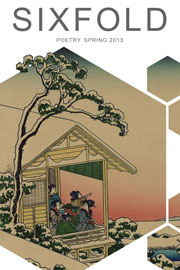
Poetry Summer 2013 fiction all issues

whitespacefiller
Sharron Singleton
Five Poems
Sarah Giragosian
Five Poems
Jenna Kilic
Five Poems
Kristina McDonald
Five Poems
Toni Hanner
Five Poems
Annie Mascorro
Five Poems
Brittney Corrigan
Three Poems
S. E. Hudgens
Four Poems
Ali Doerscher
Four Poems
David Sloan
Three Poems
Olivia Cole
Five Poems
Lucy M. Logsdon
Four Poems
Marc Pietrzykowski
Four Poems
Donna Levine Gershon
Five Poems
Eva Heisler
The Olden Days
Stephanie Rose Adams
Five Poems
Jill Kelly
Five Encounters
Ben Bever
Five Poems
Michael Hugh Lythgoe
Five Poems
Arlene Zide
Three Poems
Harry Bauld
Five Poems
Lisa Zerkle
Four Poems
Peter Mishler
Five Poems
Tim Hawkins
Five Poems
Marqus Bobesich
Four Poems
Abigail Templeton-Greene
Five Poems
Eric Duenez
Five Poems
Anne Graue
Five Poems
Susan Laughter Meyers
Five Poems
Peter Kahn
Two Poems
D. Ellis Phelps
Five Poems
Linda Sonia Miller
The Kingdom
Nicklaus Wenzel
Skagit River
Holly Cian
Five Poems
Susan Morse
Five Poems
Daniel Lassell
Five Poems
Svetlana Lavochkina
Temperate Zones
Daniel Sinderson
Three Poems
Catherine Garland
Five Poems
Michael Fleming
Five Poems
Wounds In Spring
In the season of amputees,
we live with cut limbs,
axed to the crotch, nubs;
pruned to the knuckles.
Some arborists believe
it helps the myrtle trees
to flower and blossom back
brighter, fuller even.
It is spring now,
nearly Palm Sunday.
The wounds bother me.
In the north, the clear maple
sap is frozen, unable to bleed
out to buckets for syrup.
Here the dogwoods, pears
and cherry wear
new whites, pink; redbuds
renew in Lenten purple.
Judas tree.
Pollen comes alive—
even as the freshly wounded
suffer.
Flotilla
Ebony birds float like ballerinas on pointe,
pirouettes; birds’ arabesque necks are musical,
jet-wings, sculptures afloat, sable marble
moored near the shore line below Pike’s Peak,
an onyx fleet, boats under raven sails;
charcoal swans link in a love-heart of mysterious
curves, cues, a vision of long low necks, a ritual
meant to seduce, a dipping synchronous
mirror image, cob and pen couple—feral,
ornamental, symbols of a perfect storm, disastrous;
black swans mean a surprise, the unexpected, unreal—
Sandy—black lacquer paddlers, black pearls
in a pitch pigment painting, reminiscent of a flotilla:
a wound blooms in London, a drift of open black umbrellas.
Crooked
Some sink to their knees
for an inspiration to begin a poem—
says a bespectacled teacher
at the Culture Center.
Inspiration does not come.
You must beg for it. He advises
a student to study an apple. To really
know what an apple is, be interested.
To understand an apple, really see the fruit.
Imagine if the teacher substituted woman
or life for apple.
The spinal column
is a tricky business
she says to me.
My hands apply pressure
to her shoulders; I massage
her neck, down her backbone.
She looks out the window
into the winter sun feeling
its way through breezy pines.
Do you see the tree, there?
Behind it something crosses
the trunk, reminds her
of a crucifix. It is a dark line of mulch
at the edge of a green space.
I recall the paintings in the Cafe
Monet where we ate brunch
last Sunday: spare works, a series
in thick oils, umber, whites, black, maroons.
One canvas reminded me of the Eastern Rite,
Greek Orthodox crosses—
crossbars aslant—
crooked figures in slant light.
Small Gods & Heroes
(after Ed Smith, Sculptor)
Each anatomy is incomplete: a beggar,
a wounded warrior, a speared hand,
severed, Perseus, Hercules. The artist
sculpts his gods & heroes small,
forms wax molds, leaves pinch marks,
fingerprints, pours molten metal
into hollow shells, forms bodies.
But these bronze figures are not whole,
still they convey neuroaesthetics.
We learn to feel the hurt of Hercules’ labors;
Samson weak, shorn, blunt trunk;
Sebastian stung by arrows, flesh cut.
Greek antiquities—incomplete human
shapes—mythical Medusa—what it means
to imagine ideals, glorious serpentine
long hair, to perceive suffering shapes,
a torso polished shiny in spots, indented
with shadows, stripped, a bronze Christ,
fractured, next to a column in a palace.
Mercury—no arms, headless, leaning—
ready to leave the ground with a wing
on his right heel.
March Voyeur
On a morning with two discordant crows
encamped on the roof’s peak, I believe
in afternoons. At sixteen hundred hours
a school-pencil yellow bus
brings the neighbor’s children home
as regular as the tides.
From my window looking east
I see the sun climb a little higher each hour.
Clocks will leap forward this week;
leaves are late. Winter scene
is still cleared out, thin.
In the afternoon hour a sun-bright bus
is a gift—like the single daffodil
found on my walk amid green stems
yesterday. The light shines brighter
on magnolia leaves, the brightest
green in the copse of trees I view.
Spring will fill in the patch of woods
within weeks so it will be harder to see
through to where the afternoon school bus
leaves a lemon brush stroke, van Gogh-like,
along the horizontal base of a landscape.
Michael Hugh Lythgoe is a retired Air Force officer with an MFA from Bennington College. He grew up in southern Indiana, and currently lives in Aiken, SC. His poems appear in Christianity and Literature, Innisfree Poetry Journal, Pea River, Windhover, and Petigru Review. Recently, he has been meeting with soldiers to discuss poetry in the Wounded Warriors program at Fort Gordon in Augusta, GA.
is a retired Air Force officer with an MFA from Bennington College. He grew up in southern Indiana, and currently lives in Aiken, SC. His poems appear in Christianity and Literature, Innisfree Poetry Journal, Pea River, Windhover, and Petigru Review. Recently, he has been meeting with soldiers to discuss poetry in the Wounded Warriors program at Fort Gordon in Augusta, GA.